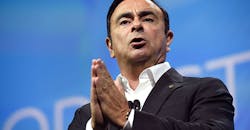Carlos Ghosn was dismissed as Mitsubishi Motors Corp. chairman in a boost to its biggest shareholder Nissan Motor Co., which has been positioning to secure more power in the alliance they share with Renault SA in the wake of the car titan’s shock arrest.
The board of the smallest and newest member of the world’s biggest auto union -- which Ghosn built and steered -- voted unanimously to remove him from the top job on Monday, according to a company filing. Chief Executive Officer Osamu Masuko will take on additional responsibility as chairman. Nissan, which owns 34% of Mitsubishi, ejected Ghosn as its chairman on Nov. 22.
“Continuing to keep Ghosn as our chairman would present a reputational risk to our company,” Masuko told reporters after the board meeting Monday, echoing last week’s comments by Nissan CEO Hiroto Saikawa. “I was honestly, absolutely shocked and struck with a sense of disbelief” after hearing the allegations against Ghosn, he said.
The downfall of Ghosn, who engineered the alliance between Renault and Nissan, risks igniting a battle for power between the two carmakers that could devolve into one of the toughest corporate slugfests of recent times. Nissan today accelerated its bid to redress imbalances in the alliance after Ghosn’s shock arrest, wanting to limit the power of its French partner to nominate officials to its board, people familiar with the plan said.
In contrast to Ghosn’s swift ouster by Nissan and Mitsubishi, Renault last week decided to keep him as CEO, but named an interim replacement.
Ghosn, 64, is accused of understating his income and misusing Nissan’s assets as part of alleged offenses Japanese prosecutors say carry a maximum sentence of 10 years in jail. The Brazil-born French executive has denied any wrongdoing, according to NHK, Japan’s national broadcaster.
With Ghosn gone, Nissan’s Saikawa is already plotting a review of the alliance to make it more equitable, according to people familiar with the plans. Renault owns about 43% of Nissan with voting rights, while the latter holds a non-voting 15% in the French maker. After turning around Renault and a teetering Nissan in the late 1990s, Ghosn added the beleaguered Mitsubishi Motors to the group in 2016.
“Mitsubishi is firmly in the Nissan camp, because Nissan is their main shareholder,” said Janet Lewis, an analyst at Macquarie Capital Securities in Tokyo. “Masuko has made it clear the future of the alliance is important to them and they will go along with supporting Nissan.”
The three carmakers are due to meet in Amsterdam this week. Nissan doesn’t expect that capital changes will be discussed at the meeting, a person familiar with the matter said. Nissan views that negotiations about rebalancing ties should be done with mutual understanding, and that first the two companies must share an understanding about the need to dismiss Ghosn, the person said.
A Nissan spokesman declined to comment.
Nissan has also long been irked by what it sees as the French government’s meddling in the alliance.
In an address to Nissan’s global employees Monday, Saikawa said Ghosn held too much power at the company. Conversations between Nissan and Renault had to go through Ghosn, who also had the final say on matters, which made such communications less meaningful, Saikawa said. Saikawa also said he feels he enjoys Renault top management’s trust, having worked with them frequently.
The structure has become increasingly controversial in Japan due to Nissan’s improved performance. Nissan sold about 5.8 million cars last year -- compared with just 3.7 million for Renault -- and provides links to China, where Renault only has a small presence, and the U.S., where the French carmaker is absent.
“The bigger issue is Nissan was in recent years contributing more to the alliance than you are seeing from Renault,” Macquarie’s Lewis said. “In that sense, it’s logical that Nissan doesn’t want to be controlled by Renault.”
According to Japanese corporate law, Renault’s voting rights could be canceled if Nissan raises its shareholding to more than 25% in the French carmaker. Under French rules, if Renault lowered its stake in Nissan below 40%, then it will help the Japanese carmaker get voting rights in the French company.
By Ma Jie
About the Author
Bloomberg
Licensed content from Bloomberg, copyright 2016.
